Business Environment Case Study: Analyzing TUI Group (2019-2022)
VerifiedAdded on 2023/06/09
|9
|2896
|342
Case Study
AI Summary
This case study report analyzes TUI Group's business environment between 2019 and 2022, focusing on the impacts of the COVID-19 pandemic and the UK government's recovery plan. The report examines the internal and external factors affecting TUI Group, including the internal business environment, micro-environment, and macro-environment. It details TUI's business overview, size, sectors of operation, competitors, organizational structure, and leadership. The analysis further explores the effects of the pandemic on TUI's internal environment, the influence of the UK government's recovery initiatives, and the impact on TUI's micro-environment components such as customers, distribution channels, media, shareholders, and employees. Additionally, the report assesses the influence of STEEPLE factors (Social, Technological, Environmental, Economic, Political, and Legal) on TUI Group's operations, providing a comprehensive understanding of the challenges and opportunities faced by the company.
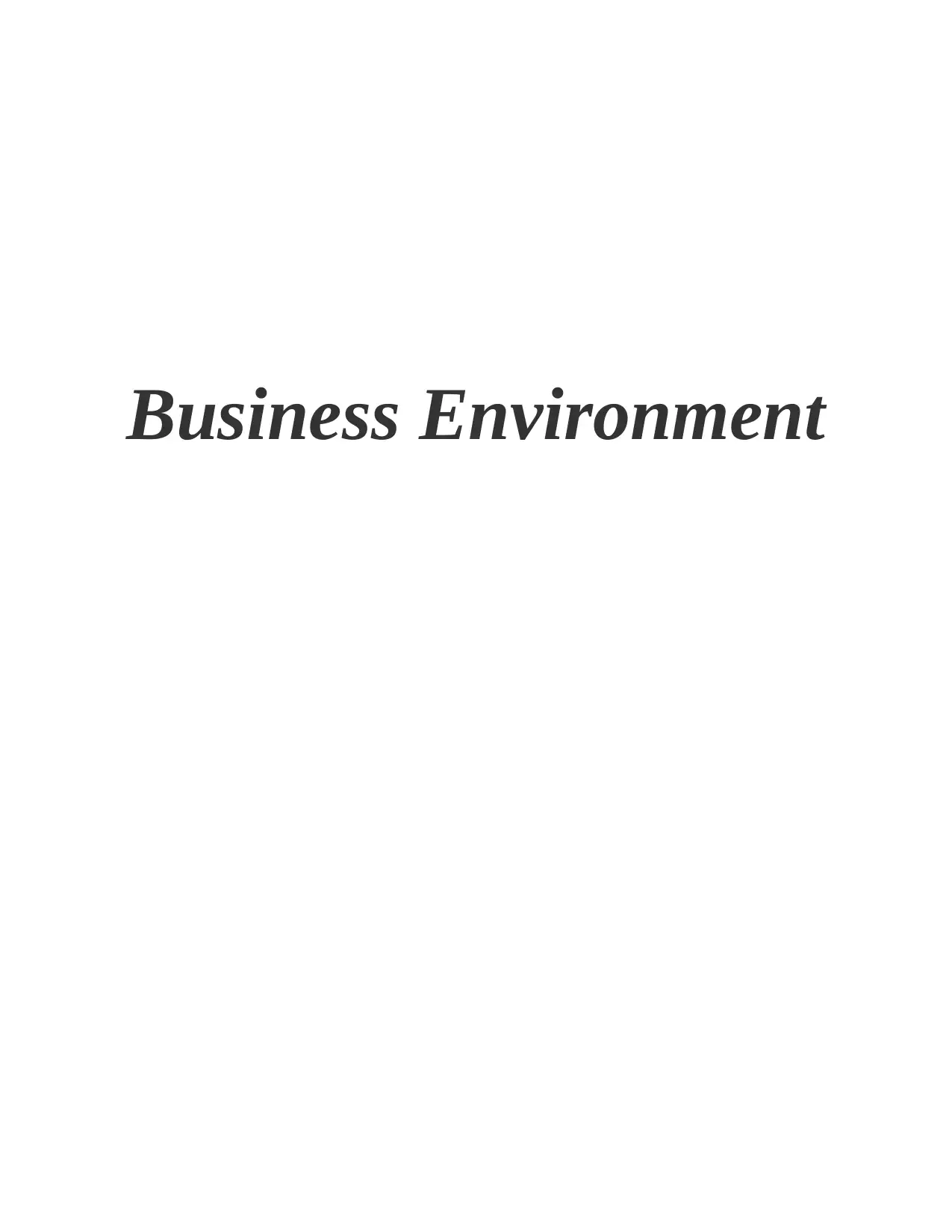
Business Environment
Paraphrase This Document
Need a fresh take? Get an instant paraphrase of this document with our AI Paraphraser
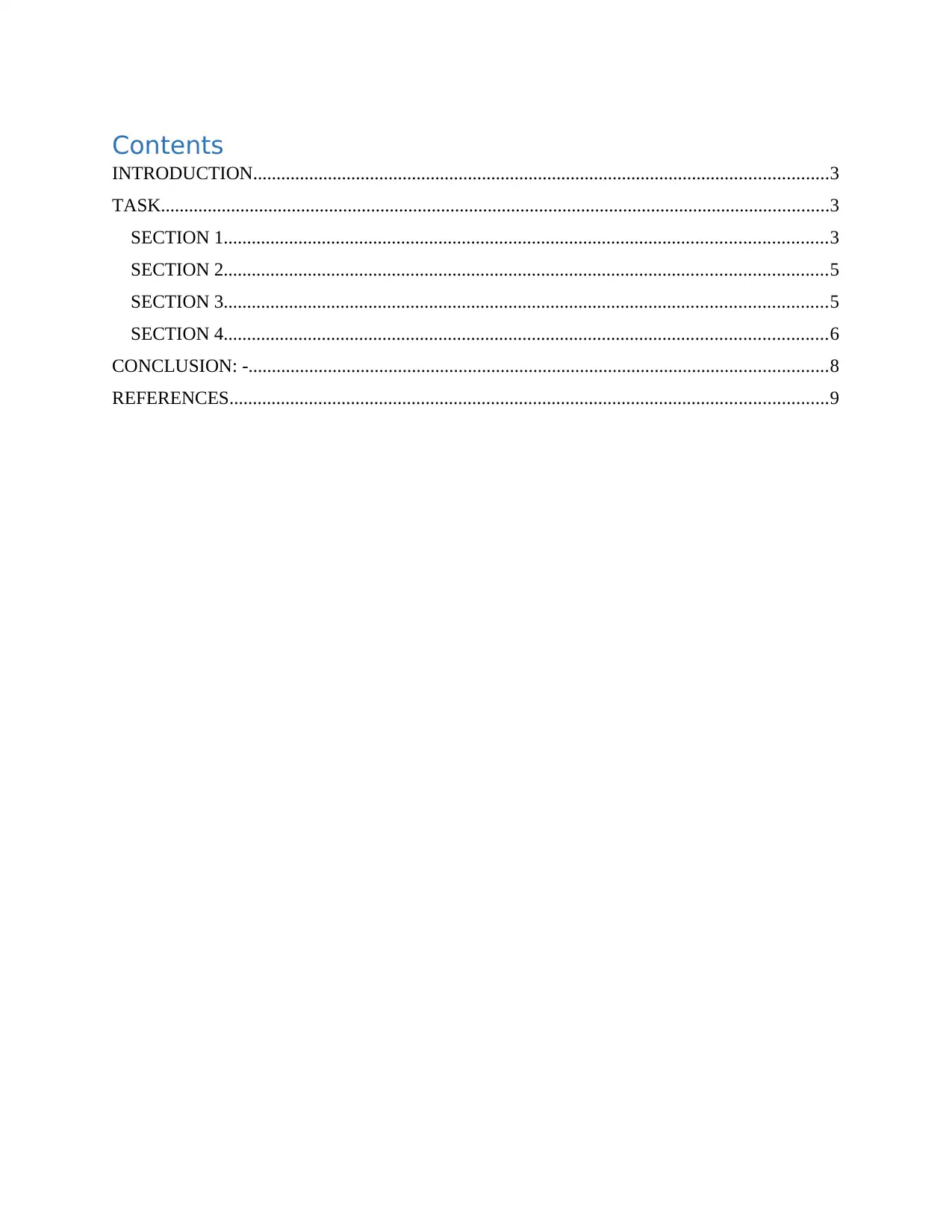
Contents
INTRODUCTION...........................................................................................................................3
TASK...............................................................................................................................................3
SECTION 1.................................................................................................................................3
SECTION 2.................................................................................................................................5
SECTION 3.................................................................................................................................5
SECTION 4.................................................................................................................................6
CONCLUSION: -............................................................................................................................8
REFERENCES................................................................................................................................9
INTRODUCTION...........................................................................................................................3
TASK...............................................................................................................................................3
SECTION 1.................................................................................................................................3
SECTION 2.................................................................................................................................5
SECTION 3.................................................................................................................................5
SECTION 4.................................................................................................................................6
CONCLUSION: -............................................................................................................................8
REFERENCES................................................................................................................................9
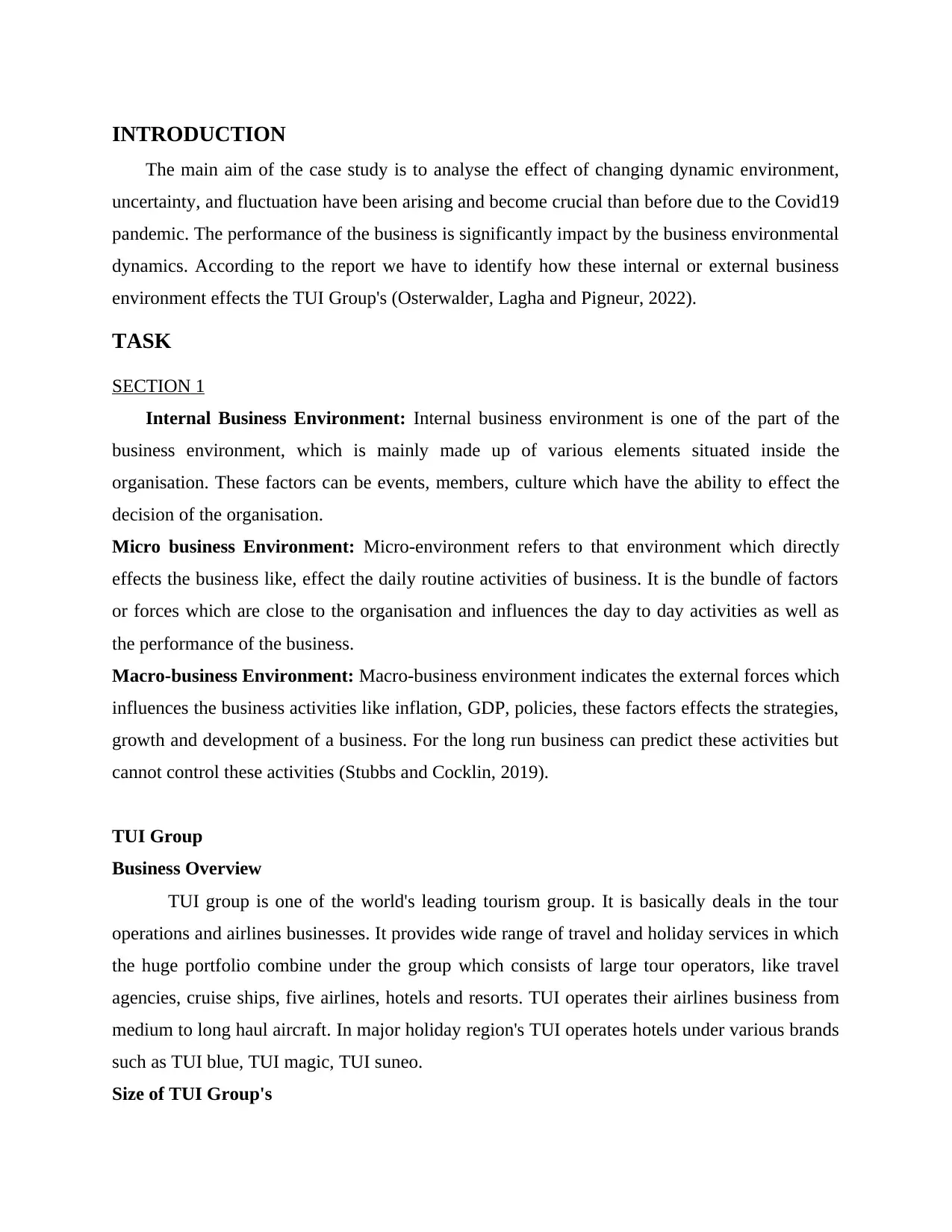
INTRODUCTION
The main aim of the case study is to analyse the effect of changing dynamic environment,
uncertainty, and fluctuation have been arising and become crucial than before due to the Covid19
pandemic. The performance of the business is significantly impact by the business environmental
dynamics. According to the report we have to identify how these internal or external business
environment effects the TUI Group's (Osterwalder, Lagha and Pigneur, 2022).
TASK
SECTION 1
Internal Business Environment: Internal business environment is one of the part of the
business environment, which is mainly made up of various elements situated inside the
organisation. These factors can be events, members, culture which have the ability to effect the
decision of the organisation.
Micro business Environment: Micro-environment refers to that environment which directly
effects the business like, effect the daily routine activities of business. It is the bundle of factors
or forces which are close to the organisation and influences the day to day activities as well as
the performance of the business.
Macro-business Environment: Macro-business environment indicates the external forces which
influences the business activities like inflation, GDP, policies, these factors effects the strategies,
growth and development of a business. For the long run business can predict these activities but
cannot control these activities (Stubbs and Cocklin, 2019).
TUI Group
Business Overview
TUI group is one of the world's leading tourism group. It is basically deals in the tour
operations and airlines businesses. It provides wide range of travel and holiday services in which
the huge portfolio combine under the group which consists of large tour operators, like travel
agencies, cruise ships, five airlines, hotels and resorts. TUI operates their airlines business from
medium to long haul aircraft. In major holiday region's TUI operates hotels under various brands
such as TUI blue, TUI magic, TUI suneo.
Size of TUI Group's
The main aim of the case study is to analyse the effect of changing dynamic environment,
uncertainty, and fluctuation have been arising and become crucial than before due to the Covid19
pandemic. The performance of the business is significantly impact by the business environmental
dynamics. According to the report we have to identify how these internal or external business
environment effects the TUI Group's (Osterwalder, Lagha and Pigneur, 2022).
TASK
SECTION 1
Internal Business Environment: Internal business environment is one of the part of the
business environment, which is mainly made up of various elements situated inside the
organisation. These factors can be events, members, culture which have the ability to effect the
decision of the organisation.
Micro business Environment: Micro-environment refers to that environment which directly
effects the business like, effect the daily routine activities of business. It is the bundle of factors
or forces which are close to the organisation and influences the day to day activities as well as
the performance of the business.
Macro-business Environment: Macro-business environment indicates the external forces which
influences the business activities like inflation, GDP, policies, these factors effects the strategies,
growth and development of a business. For the long run business can predict these activities but
cannot control these activities (Stubbs and Cocklin, 2019).
TUI Group
Business Overview
TUI group is one of the world's leading tourism group. It is basically deals in the tour
operations and airlines businesses. It provides wide range of travel and holiday services in which
the huge portfolio combine under the group which consists of large tour operators, like travel
agencies, cruise ships, five airlines, hotels and resorts. TUI operates their airlines business from
medium to long haul aircraft. In major holiday region's TUI operates hotels under various brands
such as TUI blue, TUI magic, TUI suneo.
Size of TUI Group's
⊘ This is a preview!⊘
Do you want full access?
Subscribe today to unlock all pages.

Trusted by 1+ million students worldwide
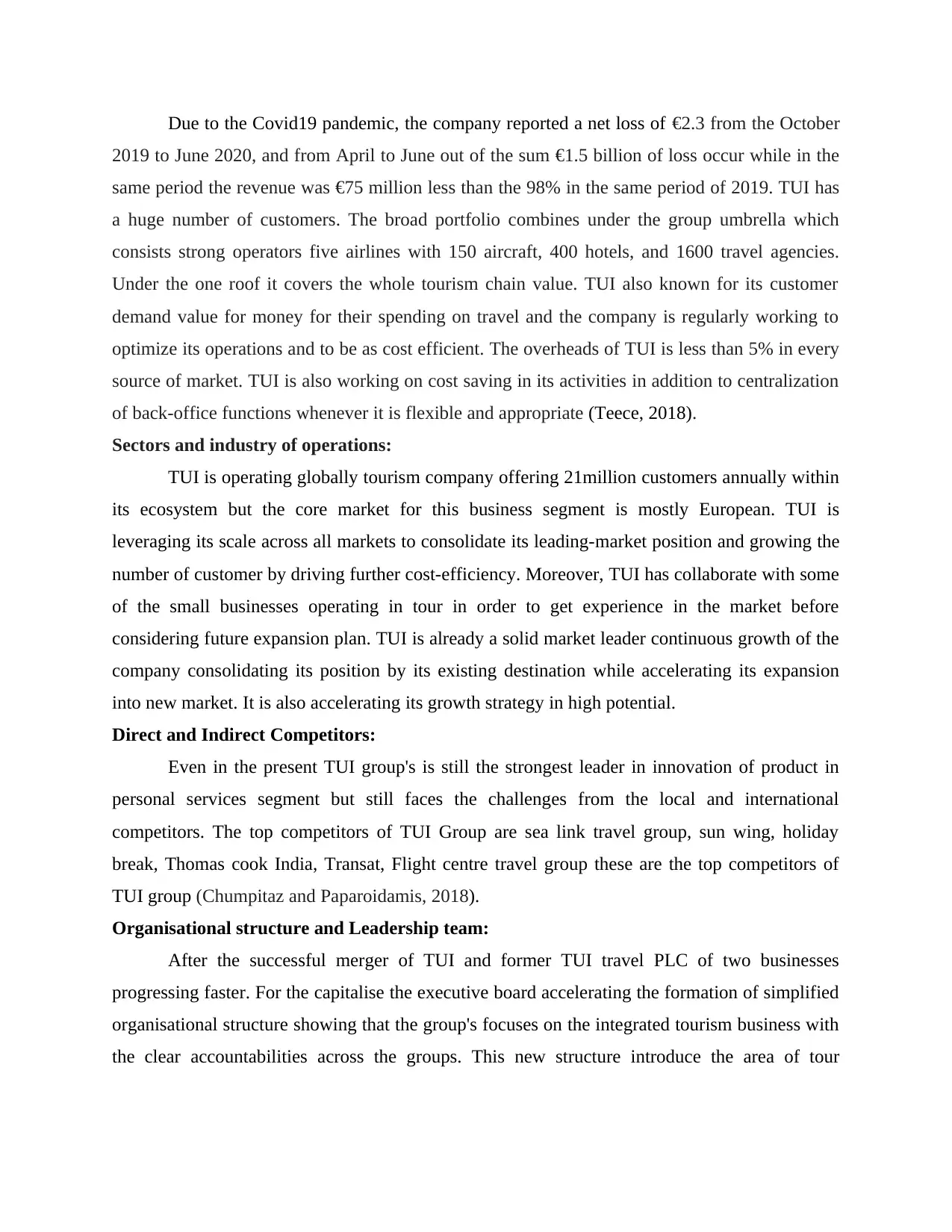
Due to the Covid19 pandemic, the company reported a net loss of €2.3 from the October
2019 to June 2020, and from April to June out of the sum €1.5 billion of loss occur while in the
same period the revenue was €75 million less than the 98% in the same period of 2019. TUI has
a huge number of customers. The broad portfolio combines under the group umbrella which
consists strong operators five airlines with 150 aircraft, 400 hotels, and 1600 travel agencies.
Under the one roof it covers the whole tourism chain value. TUI also known for its customer
demand value for money for their spending on travel and the company is regularly working to
optimize its operations and to be as cost efficient. The overheads of TUI is less than 5% in every
source of market. TUI is also working on cost saving in its activities in addition to centralization
of back-office functions whenever it is flexible and appropriate (Teece, 2018).
Sectors and industry of operations:
TUI is operating globally tourism company offering 21million customers annually within
its ecosystem but the core market for this business segment is mostly European. TUI is
leveraging its scale across all markets to consolidate its leading-market position and growing the
number of customer by driving further cost-efficiency. Moreover, TUI has collaborate with some
of the small businesses operating in tour in order to get experience in the market before
considering future expansion plan. TUI is already a solid market leader continuous growth of the
company consolidating its position by its existing destination while accelerating its expansion
into new market. It is also accelerating its growth strategy in high potential.
Direct and Indirect Competitors:
Even in the present TUI group's is still the strongest leader in innovation of product in
personal services segment but still faces the challenges from the local and international
competitors. The top competitors of TUI Group are sea link travel group, sun wing, holiday
break, Thomas cook India, Transat, Flight centre travel group these are the top competitors of
TUI group (Chumpitaz and Paparoidamis, 2018).
Organisational structure and Leadership team:
After the successful merger of TUI and former TUI travel PLC of two businesses
progressing faster. For the capitalise the executive board accelerating the formation of simplified
organisational structure showing that the group's focuses on the integrated tourism business with
the clear accountabilities across the groups. This new structure introduce the area of tour
2019 to June 2020, and from April to June out of the sum €1.5 billion of loss occur while in the
same period the revenue was €75 million less than the 98% in the same period of 2019. TUI has
a huge number of customers. The broad portfolio combines under the group umbrella which
consists strong operators five airlines with 150 aircraft, 400 hotels, and 1600 travel agencies.
Under the one roof it covers the whole tourism chain value. TUI also known for its customer
demand value for money for their spending on travel and the company is regularly working to
optimize its operations and to be as cost efficient. The overheads of TUI is less than 5% in every
source of market. TUI is also working on cost saving in its activities in addition to centralization
of back-office functions whenever it is flexible and appropriate (Teece, 2018).
Sectors and industry of operations:
TUI is operating globally tourism company offering 21million customers annually within
its ecosystem but the core market for this business segment is mostly European. TUI is
leveraging its scale across all markets to consolidate its leading-market position and growing the
number of customer by driving further cost-efficiency. Moreover, TUI has collaborate with some
of the small businesses operating in tour in order to get experience in the market before
considering future expansion plan. TUI is already a solid market leader continuous growth of the
company consolidating its position by its existing destination while accelerating its expansion
into new market. It is also accelerating its growth strategy in high potential.
Direct and Indirect Competitors:
Even in the present TUI group's is still the strongest leader in innovation of product in
personal services segment but still faces the challenges from the local and international
competitors. The top competitors of TUI Group are sea link travel group, sun wing, holiday
break, Thomas cook India, Transat, Flight centre travel group these are the top competitors of
TUI group (Chumpitaz and Paparoidamis, 2018).
Organisational structure and Leadership team:
After the successful merger of TUI and former TUI travel PLC of two businesses
progressing faster. For the capitalise the executive board accelerating the formation of simplified
organisational structure showing that the group's focuses on the integrated tourism business with
the clear accountabilities across the groups. This new structure introduce the area of tour
Paraphrase This Document
Need a fresh take? Get an instant paraphrase of this document with our AI Paraphraser
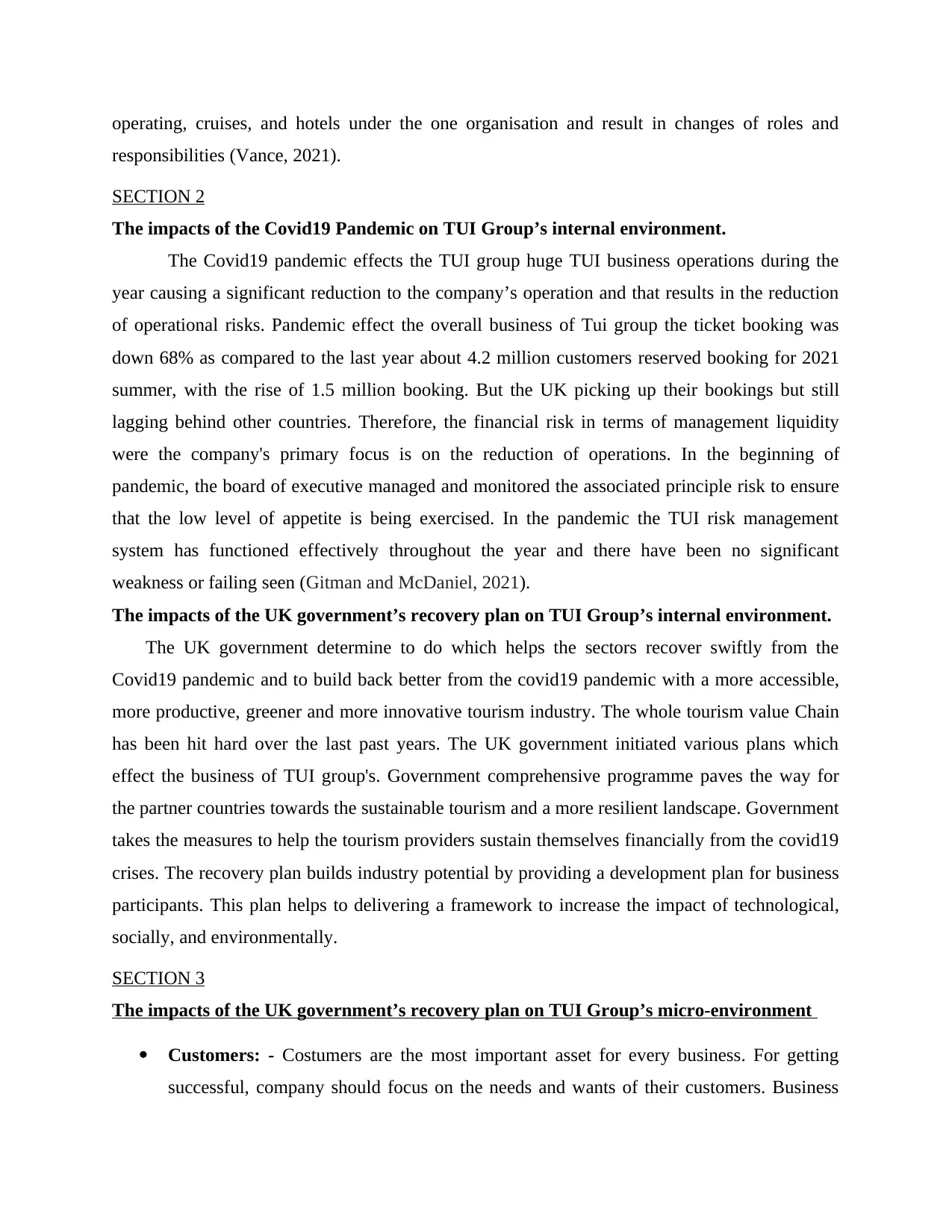
operating, cruises, and hotels under the one organisation and result in changes of roles and
responsibilities (Vance, 2021).
SECTION 2
The impacts of the Covid19 Pandemic on TUI Group’s internal environment.
The Covid19 pandemic effects the TUI group huge TUI business operations during the
year causing a significant reduction to the company’s operation and that results in the reduction
of operational risks. Pandemic effect the overall business of Tui group the ticket booking was
down 68% as compared to the last year about 4.2 million customers reserved booking for 2021
summer, with the rise of 1.5 million booking. But the UK picking up their bookings but still
lagging behind other countries. Therefore, the financial risk in terms of management liquidity
were the company's primary focus is on the reduction of operations. In the beginning of
pandemic, the board of executive managed and monitored the associated principle risk to ensure
that the low level of appetite is being exercised. In the pandemic the TUI risk management
system has functioned effectively throughout the year and there have been no significant
weakness or failing seen (Gitman and McDaniel, 2021).
The impacts of the UK government’s recovery plan on TUI Group’s internal environment.
The UK government determine to do which helps the sectors recover swiftly from the
Covid19 pandemic and to build back better from the covid19 pandemic with a more accessible,
more productive, greener and more innovative tourism industry. The whole tourism value Chain
has been hit hard over the last past years. The UK government initiated various plans which
effect the business of TUI group's. Government comprehensive programme paves the way for
the partner countries towards the sustainable tourism and a more resilient landscape. Government
takes the measures to help the tourism providers sustain themselves financially from the covid19
crises. The recovery plan builds industry potential by providing a development plan for business
participants. This plan helps to delivering a framework to increase the impact of technological,
socially, and environmentally.
SECTION 3
The impacts of the UK government’s recovery plan on TUI Group’s micro-environment
Customers: - Costumers are the most important asset for every business. For getting
successful, company should focus on the needs and wants of their customers. Business
responsibilities (Vance, 2021).
SECTION 2
The impacts of the Covid19 Pandemic on TUI Group’s internal environment.
The Covid19 pandemic effects the TUI group huge TUI business operations during the
year causing a significant reduction to the company’s operation and that results in the reduction
of operational risks. Pandemic effect the overall business of Tui group the ticket booking was
down 68% as compared to the last year about 4.2 million customers reserved booking for 2021
summer, with the rise of 1.5 million booking. But the UK picking up their bookings but still
lagging behind other countries. Therefore, the financial risk in terms of management liquidity
were the company's primary focus is on the reduction of operations. In the beginning of
pandemic, the board of executive managed and monitored the associated principle risk to ensure
that the low level of appetite is being exercised. In the pandemic the TUI risk management
system has functioned effectively throughout the year and there have been no significant
weakness or failing seen (Gitman and McDaniel, 2021).
The impacts of the UK government’s recovery plan on TUI Group’s internal environment.
The UK government determine to do which helps the sectors recover swiftly from the
Covid19 pandemic and to build back better from the covid19 pandemic with a more accessible,
more productive, greener and more innovative tourism industry. The whole tourism value Chain
has been hit hard over the last past years. The UK government initiated various plans which
effect the business of TUI group's. Government comprehensive programme paves the way for
the partner countries towards the sustainable tourism and a more resilient landscape. Government
takes the measures to help the tourism providers sustain themselves financially from the covid19
crises. The recovery plan builds industry potential by providing a development plan for business
participants. This plan helps to delivering a framework to increase the impact of technological,
socially, and environmentally.
SECTION 3
The impacts of the UK government’s recovery plan on TUI Group’s micro-environment
Customers: - Costumers are the most important asset for every business. For getting
successful, company should focus on the needs and wants of their customers. Business
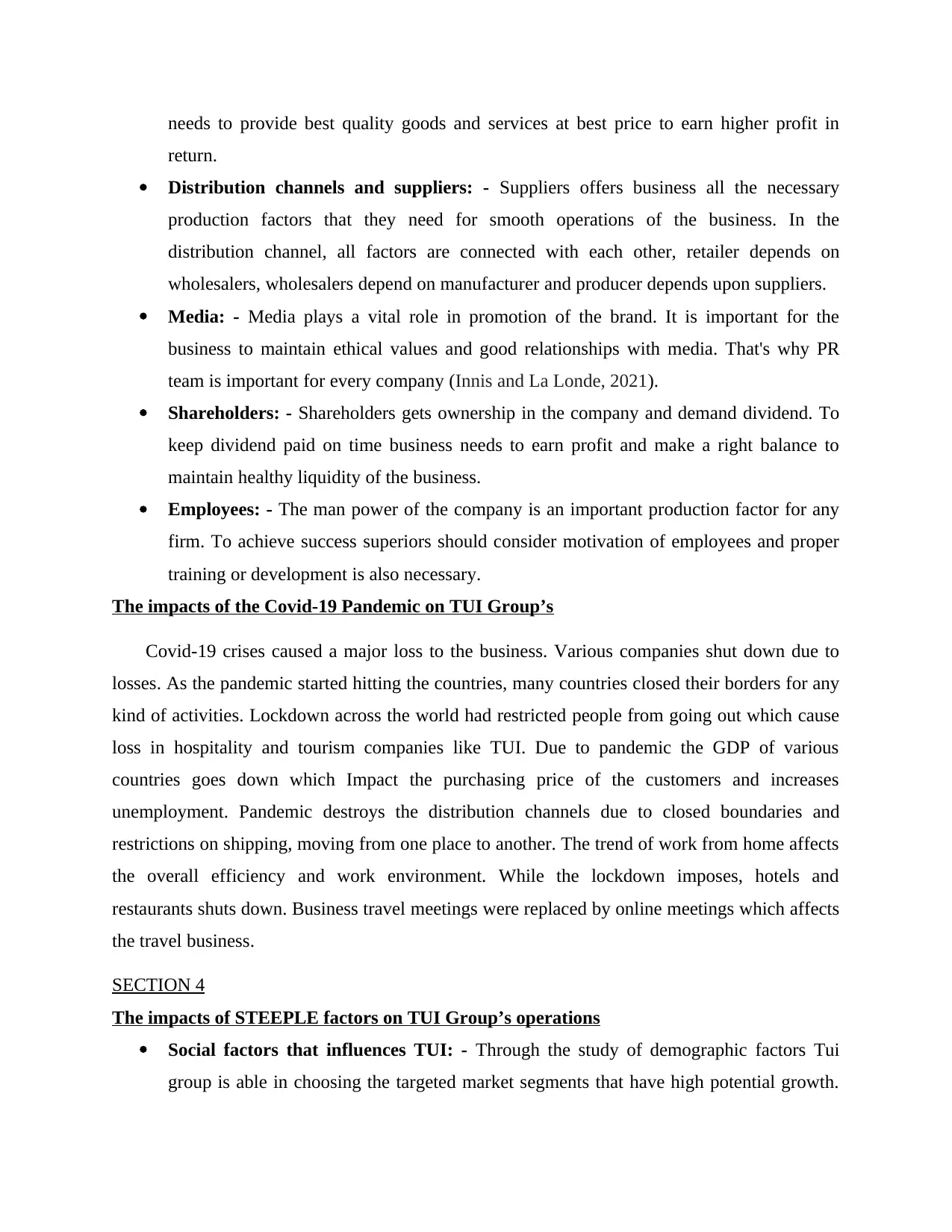
needs to provide best quality goods and services at best price to earn higher profit in
return.
Distribution channels and suppliers: - Suppliers offers business all the necessary
production factors that they need for smooth operations of the business. In the
distribution channel, all factors are connected with each other, retailer depends on
wholesalers, wholesalers depend on manufacturer and producer depends upon suppliers.
Media: - Media plays a vital role in promotion of the brand. It is important for the
business to maintain ethical values and good relationships with media. That's why PR
team is important for every company (Innis and La Londe, 2021).
Shareholders: - Shareholders gets ownership in the company and demand dividend. To
keep dividend paid on time business needs to earn profit and make a right balance to
maintain healthy liquidity of the business.
Employees: - The man power of the company is an important production factor for any
firm. To achieve success superiors should consider motivation of employees and proper
training or development is also necessary.
The impacts of the Covid-19 Pandemic on TUI Group’s
Covid-19 crises caused a major loss to the business. Various companies shut down due to
losses. As the pandemic started hitting the countries, many countries closed their borders for any
kind of activities. Lockdown across the world had restricted people from going out which cause
loss in hospitality and tourism companies like TUI. Due to pandemic the GDP of various
countries goes down which Impact the purchasing price of the customers and increases
unemployment. Pandemic destroys the distribution channels due to closed boundaries and
restrictions on shipping, moving from one place to another. The trend of work from home affects
the overall efficiency and work environment. While the lockdown imposes, hotels and
restaurants shuts down. Business travel meetings were replaced by online meetings which affects
the travel business.
SECTION 4
The impacts of STEEPLE factors on TUI Group’s operations
Social factors that influences TUI: - Through the study of demographic factors Tui
group is able in choosing the targeted market segments that have high potential growth.
return.
Distribution channels and suppliers: - Suppliers offers business all the necessary
production factors that they need for smooth operations of the business. In the
distribution channel, all factors are connected with each other, retailer depends on
wholesalers, wholesalers depend on manufacturer and producer depends upon suppliers.
Media: - Media plays a vital role in promotion of the brand. It is important for the
business to maintain ethical values and good relationships with media. That's why PR
team is important for every company (Innis and La Londe, 2021).
Shareholders: - Shareholders gets ownership in the company and demand dividend. To
keep dividend paid on time business needs to earn profit and make a right balance to
maintain healthy liquidity of the business.
Employees: - The man power of the company is an important production factor for any
firm. To achieve success superiors should consider motivation of employees and proper
training or development is also necessary.
The impacts of the Covid-19 Pandemic on TUI Group’s
Covid-19 crises caused a major loss to the business. Various companies shut down due to
losses. As the pandemic started hitting the countries, many countries closed their borders for any
kind of activities. Lockdown across the world had restricted people from going out which cause
loss in hospitality and tourism companies like TUI. Due to pandemic the GDP of various
countries goes down which Impact the purchasing price of the customers and increases
unemployment. Pandemic destroys the distribution channels due to closed boundaries and
restrictions on shipping, moving from one place to another. The trend of work from home affects
the overall efficiency and work environment. While the lockdown imposes, hotels and
restaurants shuts down. Business travel meetings were replaced by online meetings which affects
the travel business.
SECTION 4
The impacts of STEEPLE factors on TUI Group’s operations
Social factors that influences TUI: - Through the study of demographic factors Tui
group is able in choosing the targeted market segments that have high potential growth.
⊘ This is a preview!⊘
Do you want full access?
Subscribe today to unlock all pages.

Trusted by 1+ million students worldwide
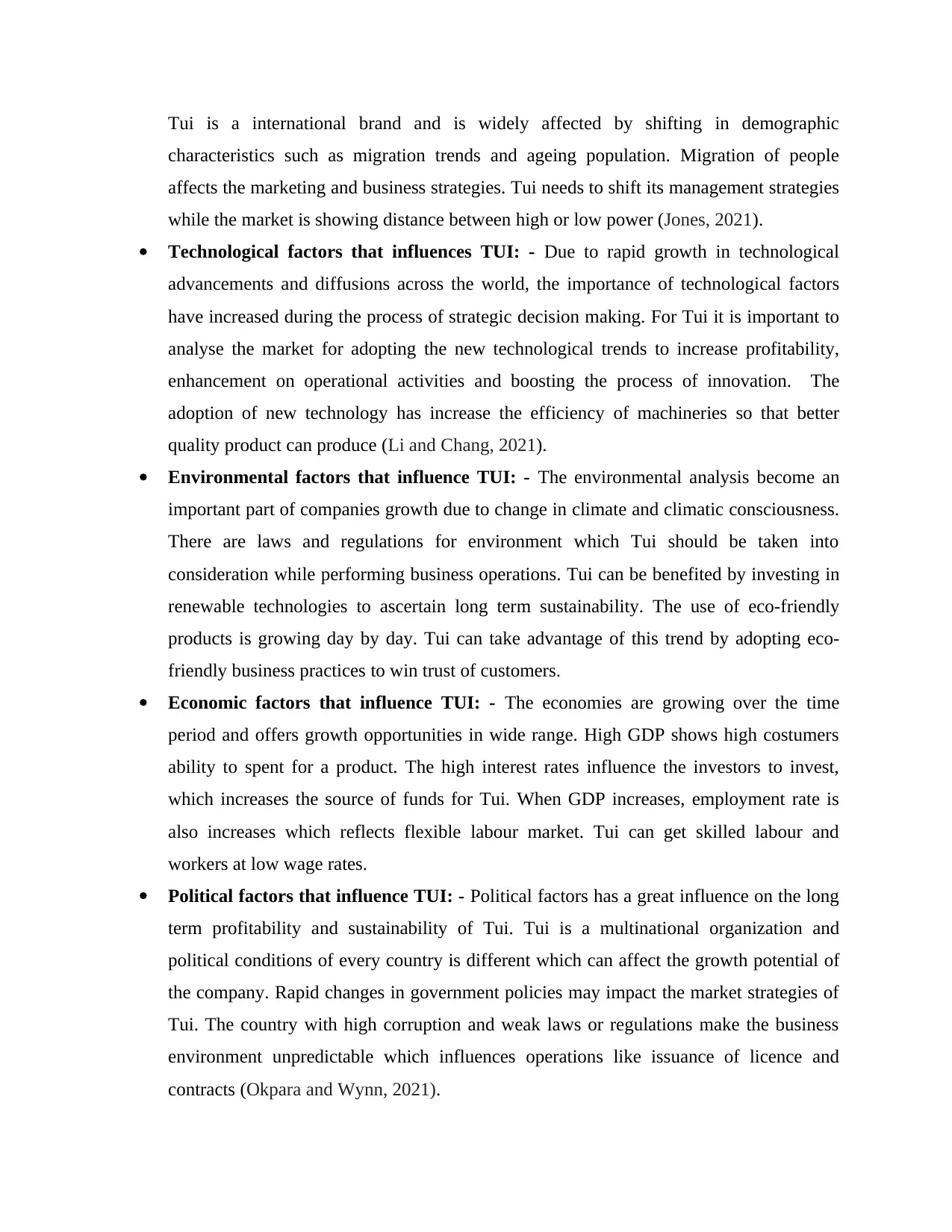
Tui is a international brand and is widely affected by shifting in demographic
characteristics such as migration trends and ageing population. Migration of people
affects the marketing and business strategies. Tui needs to shift its management strategies
while the market is showing distance between high or low power (Jones, 2021).
Technological factors that influences TUI: - Due to rapid growth in technological
advancements and diffusions across the world, the importance of technological factors
have increased during the process of strategic decision making. For Tui it is important to
analyse the market for adopting the new technological trends to increase profitability,
enhancement on operational activities and boosting the process of innovation. The
adoption of new technology has increase the efficiency of machineries so that better
quality product can produce (Li and Chang, 2021).
Environmental factors that influence TUI: - The environmental analysis become an
important part of companies growth due to change in climate and climatic consciousness.
There are laws and regulations for environment which Tui should be taken into
consideration while performing business operations. Tui can be benefited by investing in
renewable technologies to ascertain long term sustainability. The use of eco-friendly
products is growing day by day. Tui can take advantage of this trend by adopting eco-
friendly business practices to win trust of customers.
Economic factors that influence TUI: - The economies are growing over the time
period and offers growth opportunities in wide range. High GDP shows high costumers
ability to spent for a product. The high interest rates influence the investors to invest,
which increases the source of funds for Tui. When GDP increases, employment rate is
also increases which reflects flexible labour market. Tui can get skilled labour and
workers at low wage rates.
Political factors that influence TUI: - Political factors has a great influence on the long
term profitability and sustainability of Tui. Tui is a multinational organization and
political conditions of every country is different which can affect the growth potential of
the company. Rapid changes in government policies may impact the market strategies of
Tui. The country with high corruption and weak laws or regulations make the business
environment unpredictable which influences operations like issuance of licence and
contracts (Okpara and Wynn, 2021).
characteristics such as migration trends and ageing population. Migration of people
affects the marketing and business strategies. Tui needs to shift its management strategies
while the market is showing distance between high or low power (Jones, 2021).
Technological factors that influences TUI: - Due to rapid growth in technological
advancements and diffusions across the world, the importance of technological factors
have increased during the process of strategic decision making. For Tui it is important to
analyse the market for adopting the new technological trends to increase profitability,
enhancement on operational activities and boosting the process of innovation. The
adoption of new technology has increase the efficiency of machineries so that better
quality product can produce (Li and Chang, 2021).
Environmental factors that influence TUI: - The environmental analysis become an
important part of companies growth due to change in climate and climatic consciousness.
There are laws and regulations for environment which Tui should be taken into
consideration while performing business operations. Tui can be benefited by investing in
renewable technologies to ascertain long term sustainability. The use of eco-friendly
products is growing day by day. Tui can take advantage of this trend by adopting eco-
friendly business practices to win trust of customers.
Economic factors that influence TUI: - The economies are growing over the time
period and offers growth opportunities in wide range. High GDP shows high costumers
ability to spent for a product. The high interest rates influence the investors to invest,
which increases the source of funds for Tui. When GDP increases, employment rate is
also increases which reflects flexible labour market. Tui can get skilled labour and
workers at low wage rates.
Political factors that influence TUI: - Political factors has a great influence on the long
term profitability and sustainability of Tui. Tui is a multinational organization and
political conditions of every country is different which can affect the growth potential of
the company. Rapid changes in government policies may impact the market strategies of
Tui. The country with high corruption and weak laws or regulations make the business
environment unpredictable which influences operations like issuance of licence and
contracts (Okpara and Wynn, 2021).
Paraphrase This Document
Need a fresh take? Get an instant paraphrase of this document with our AI Paraphraser
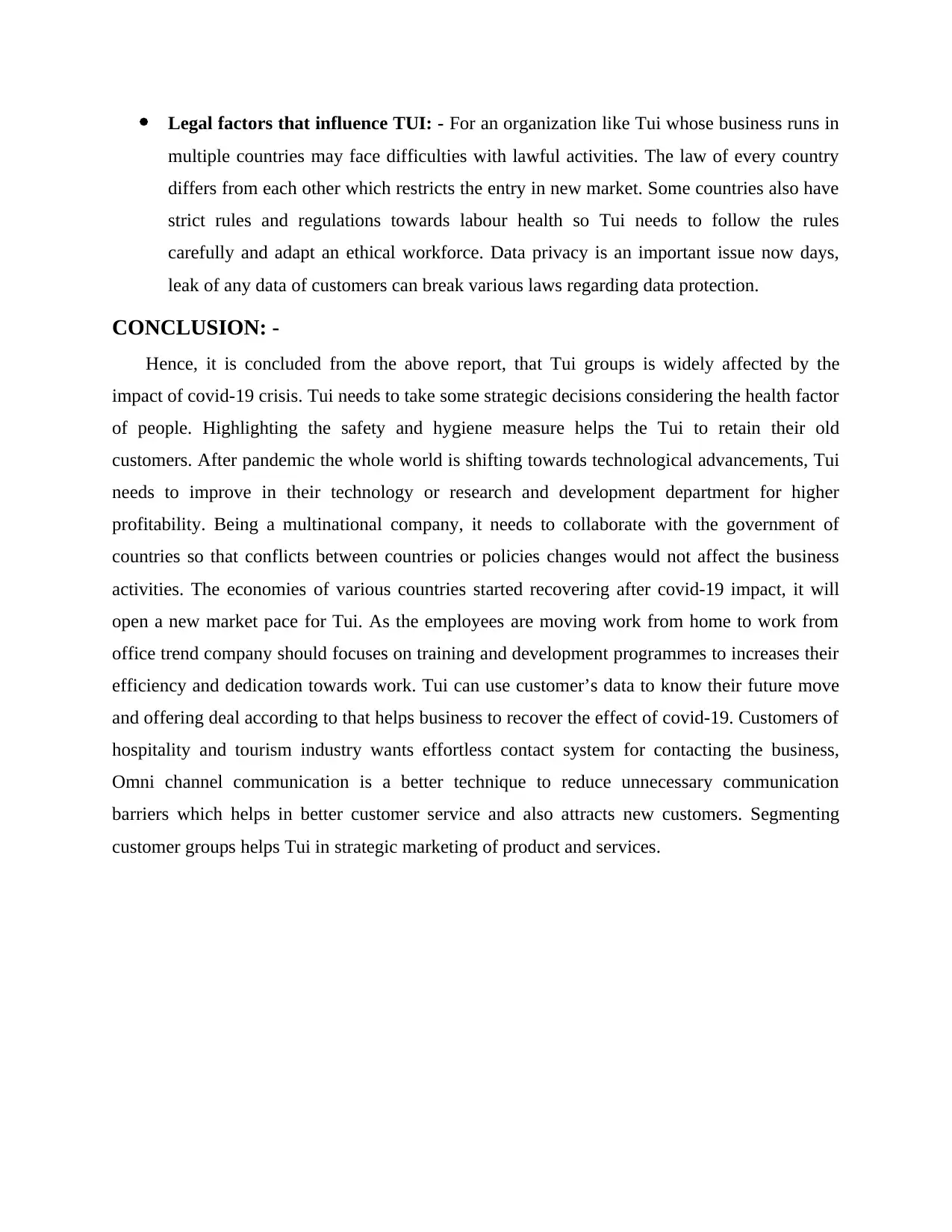
Legal factors that influence TUI: - For an organization like Tui whose business runs in
multiple countries may face difficulties with lawful activities. The law of every country
differs from each other which restricts the entry in new market. Some countries also have
strict rules and regulations towards labour health so Tui needs to follow the rules
carefully and adapt an ethical workforce. Data privacy is an important issue now days,
leak of any data of customers can break various laws regarding data protection.
CONCLUSION: -
Hence, it is concluded from the above report, that Tui groups is widely affected by the
impact of covid-19 crisis. Tui needs to take some strategic decisions considering the health factor
of people. Highlighting the safety and hygiene measure helps the Tui to retain their old
customers. After pandemic the whole world is shifting towards technological advancements, Tui
needs to improve in their technology or research and development department for higher
profitability. Being a multinational company, it needs to collaborate with the government of
countries so that conflicts between countries or policies changes would not affect the business
activities. The economies of various countries started recovering after covid-19 impact, it will
open a new market pace for Tui. As the employees are moving work from home to work from
office trend company should focuses on training and development programmes to increases their
efficiency and dedication towards work. Tui can use customer’s data to know their future move
and offering deal according to that helps business to recover the effect of covid-19. Customers of
hospitality and tourism industry wants effortless contact system for contacting the business,
Omni channel communication is a better technique to reduce unnecessary communication
barriers which helps in better customer service and also attracts new customers. Segmenting
customer groups helps Tui in strategic marketing of product and services.
multiple countries may face difficulties with lawful activities. The law of every country
differs from each other which restricts the entry in new market. Some countries also have
strict rules and regulations towards labour health so Tui needs to follow the rules
carefully and adapt an ethical workforce. Data privacy is an important issue now days,
leak of any data of customers can break various laws regarding data protection.
CONCLUSION: -
Hence, it is concluded from the above report, that Tui groups is widely affected by the
impact of covid-19 crisis. Tui needs to take some strategic decisions considering the health factor
of people. Highlighting the safety and hygiene measure helps the Tui to retain their old
customers. After pandemic the whole world is shifting towards technological advancements, Tui
needs to improve in their technology or research and development department for higher
profitability. Being a multinational company, it needs to collaborate with the government of
countries so that conflicts between countries or policies changes would not affect the business
activities. The economies of various countries started recovering after covid-19 impact, it will
open a new market pace for Tui. As the employees are moving work from home to work from
office trend company should focuses on training and development programmes to increases their
efficiency and dedication towards work. Tui can use customer’s data to know their future move
and offering deal according to that helps business to recover the effect of covid-19. Customers of
hospitality and tourism industry wants effortless contact system for contacting the business,
Omni channel communication is a better technique to reduce unnecessary communication
barriers which helps in better customer service and also attracts new customers. Segmenting
customer groups helps Tui in strategic marketing of product and services.
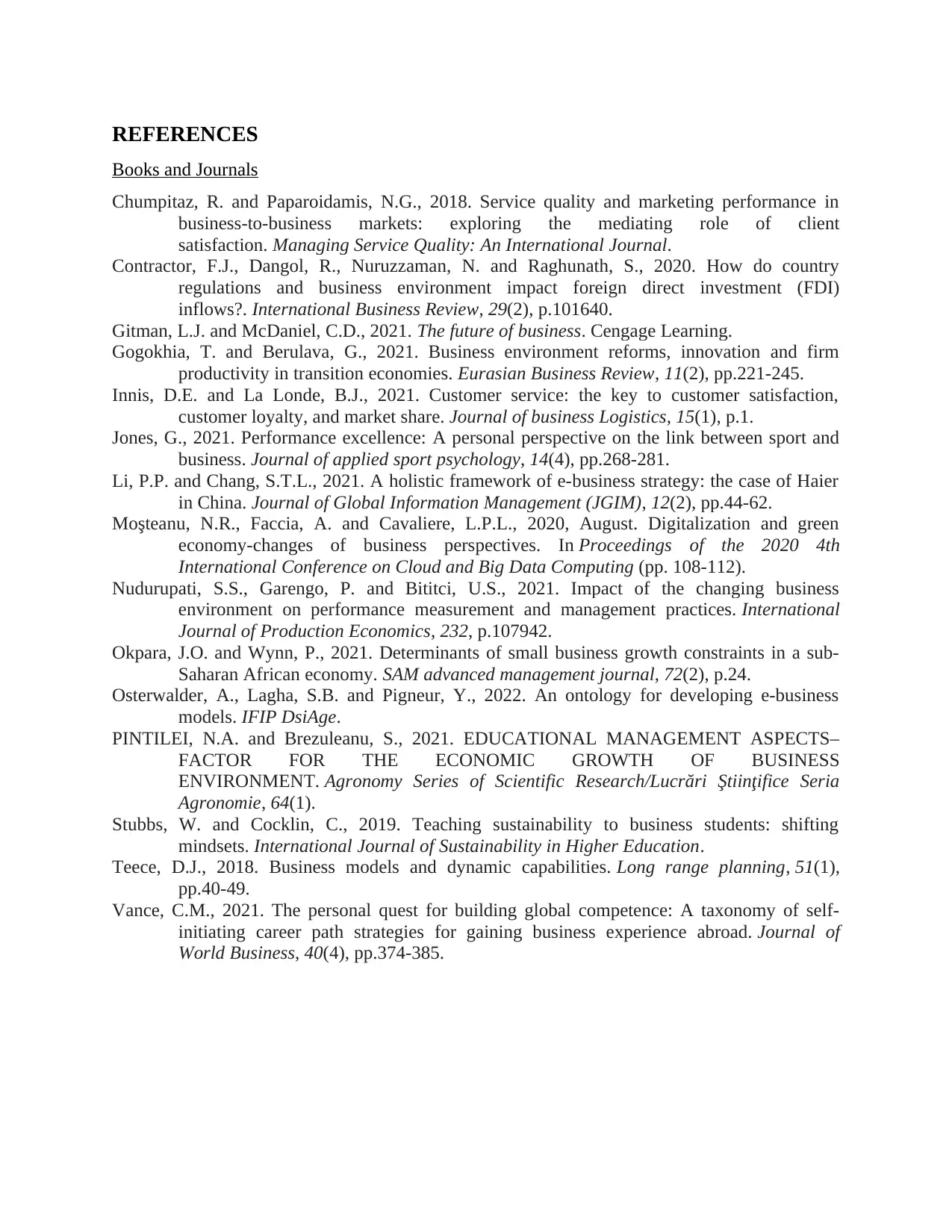
REFERENCES
Books and Journals
Chumpitaz, R. and Paparoidamis, N.G., 2018. Service quality and marketing performance in
business‐to‐business markets: exploring the mediating role of client
satisfaction. Managing Service Quality: An International Journal.
Contractor, F.J., Dangol, R., Nuruzzaman, N. and Raghunath, S., 2020. How do country
regulations and business environment impact foreign direct investment (FDI)
inflows?. International Business Review, 29(2), p.101640.
Gitman, L.J. and McDaniel, C.D., 2021. The future of business. Cengage Learning.
Gogokhia, T. and Berulava, G., 2021. Business environment reforms, innovation and firm
productivity in transition economies. Eurasian Business Review, 11(2), pp.221-245.
Innis, D.E. and La Londe, B.J., 2021. Customer service: the key to customer satisfaction,
customer loyalty, and market share. Journal of business Logistics, 15(1), p.1.
Jones, G., 2021. Performance excellence: A personal perspective on the link between sport and
business. Journal of applied sport psychology, 14(4), pp.268-281.
Li, P.P. and Chang, S.T.L., 2021. A holistic framework of e-business strategy: the case of Haier
in China. Journal of Global Information Management (JGIM), 12(2), pp.44-62.
Moşteanu, N.R., Faccia, A. and Cavaliere, L.P.L., 2020, August. Digitalization and green
economy-changes of business perspectives. In Proceedings of the 2020 4th
International Conference on Cloud and Big Data Computing (pp. 108-112).
Nudurupati, S.S., Garengo, P. and Bititci, U.S., 2021. Impact of the changing business
environment on performance measurement and management practices. International
Journal of Production Economics, 232, p.107942.
Okpara, J.O. and Wynn, P., 2021. Determinants of small business growth constraints in a sub-
Saharan African economy. SAM advanced management journal, 72(2), p.24.
Osterwalder, A., Lagha, S.B. and Pigneur, Y., 2022. An ontology for developing e-business
models. IFIP DsiAge.
PINTILEI, N.A. and Brezuleanu, S., 2021. EDUCATIONAL MANAGEMENT ASPECTS–
FACTOR FOR THE ECONOMIC GROWTH OF BUSINESS
ENVIRONMENT. Agronomy Series of Scientific Research/Lucrări Ştiinţifice Seria
Agronomie, 64(1).
Stubbs, W. and Cocklin, C., 2019. Teaching sustainability to business students: shifting
mindsets. International Journal of Sustainability in Higher Education.
Teece, D.J., 2018. Business models and dynamic capabilities. Long range planning, 51(1),
pp.40-49.
Vance, C.M., 2021. The personal quest for building global competence: A taxonomy of self-
initiating career path strategies for gaining business experience abroad. Journal of
World Business, 40(4), pp.374-385.
Books and Journals
Chumpitaz, R. and Paparoidamis, N.G., 2018. Service quality and marketing performance in
business‐to‐business markets: exploring the mediating role of client
satisfaction. Managing Service Quality: An International Journal.
Contractor, F.J., Dangol, R., Nuruzzaman, N. and Raghunath, S., 2020. How do country
regulations and business environment impact foreign direct investment (FDI)
inflows?. International Business Review, 29(2), p.101640.
Gitman, L.J. and McDaniel, C.D., 2021. The future of business. Cengage Learning.
Gogokhia, T. and Berulava, G., 2021. Business environment reforms, innovation and firm
productivity in transition economies. Eurasian Business Review, 11(2), pp.221-245.
Innis, D.E. and La Londe, B.J., 2021. Customer service: the key to customer satisfaction,
customer loyalty, and market share. Journal of business Logistics, 15(1), p.1.
Jones, G., 2021. Performance excellence: A personal perspective on the link between sport and
business. Journal of applied sport psychology, 14(4), pp.268-281.
Li, P.P. and Chang, S.T.L., 2021. A holistic framework of e-business strategy: the case of Haier
in China. Journal of Global Information Management (JGIM), 12(2), pp.44-62.
Moşteanu, N.R., Faccia, A. and Cavaliere, L.P.L., 2020, August. Digitalization and green
economy-changes of business perspectives. In Proceedings of the 2020 4th
International Conference on Cloud and Big Data Computing (pp. 108-112).
Nudurupati, S.S., Garengo, P. and Bititci, U.S., 2021. Impact of the changing business
environment on performance measurement and management practices. International
Journal of Production Economics, 232, p.107942.
Okpara, J.O. and Wynn, P., 2021. Determinants of small business growth constraints in a sub-
Saharan African economy. SAM advanced management journal, 72(2), p.24.
Osterwalder, A., Lagha, S.B. and Pigneur, Y., 2022. An ontology for developing e-business
models. IFIP DsiAge.
PINTILEI, N.A. and Brezuleanu, S., 2021. EDUCATIONAL MANAGEMENT ASPECTS–
FACTOR FOR THE ECONOMIC GROWTH OF BUSINESS
ENVIRONMENT. Agronomy Series of Scientific Research/Lucrări Ştiinţifice Seria
Agronomie, 64(1).
Stubbs, W. and Cocklin, C., 2019. Teaching sustainability to business students: shifting
mindsets. International Journal of Sustainability in Higher Education.
Teece, D.J., 2018. Business models and dynamic capabilities. Long range planning, 51(1),
pp.40-49.
Vance, C.M., 2021. The personal quest for building global competence: A taxonomy of self-
initiating career path strategies for gaining business experience abroad. Journal of
World Business, 40(4), pp.374-385.
⊘ This is a preview!⊘
Do you want full access?
Subscribe today to unlock all pages.

Trusted by 1+ million students worldwide
1 out of 9
Related Documents
Your All-in-One AI-Powered Toolkit for Academic Success.
+13062052269
info@desklib.com
Available 24*7 on WhatsApp / Email
![[object Object]](/_next/static/media/star-bottom.7253800d.svg)
Unlock your academic potential
Copyright © 2020–2025 A2Z Services. All Rights Reserved. Developed and managed by ZUCOL.


